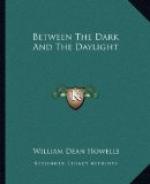“Come in! come in!” Minver called to him. “Thought you were in Japan?”
“My dear fellow,” Halson answered, “you must brush up your contemporary history. It’s more than a fortnight since I was in Japan.” He shook hands with me, and I introduced him to Rulledge and Wanhope. He said at once: “Well, what is it? Question of Braybridge’s engagement? It’s humiliating to a man to come back from the antipodes and find the nation absorbed in a parochial problem like that. Everybody I’ve met here to-night has asked me, the first thing, if I’d heard of it, and if I knew how it could have happened.”
“And do you?” Rulledge asked.
“I can give a pretty good guess,” Halson said, running his merry eyes over our faces.
“Anybody can give a good guess,” Rulledge said. “Wanhope is doing it now.”
“Don’t let me interrupt.” Halson turned to him politely.
“Not at all. I’d rather hear your guess, if you know Braybridge better than I,” Wanhope said.
“Well,” Halson compromised, “perhaps I’ve known him longer.” He asked, with an effect of coming to business: “Where were you?”
“Tell him, Rulledge,” Minver ordered, and Rulledge apparently asked nothing better. He told him, in detail, all we knew from any source, down to the moment of Wanhope’s arrested conjecture.
“He did leave you at an anxious point, didn’t he?” Halson smiled to the rest of us at Rulledge’s expense, and then said: “Well, I think I can help you out a little. Any of you know the lady?”
“By sight, Minver does,” Rulledge answered for us. “Wants to paint her.”
“Of course,” Halson said, with intelligence. “But I doubt if he’d find her as paintable as she looks, at first. She’s beautiful, but her charm is spiritual.”
“Sometimes we try for that,” the painter interposed.
“And sometimes you get it. But you’ll allow it’s difficult. That’s all I meant. I’ve known her—let me see—for twelve years, at least; ever since I first went West. She was about eleven then, and her father was bringing her up on the ranch. Her aunt came along by and by and took her to Europe—mother dead before Hazelwood went out there. But the girl was always homesick for the ranch; she pined for it; and after they had kept her in Germany three or four years they let her come back and run wild again—wild as a flower does, or a vine, not a domesticated animal.”
“Go slow, Halson. This is getting too much for the romantic Rulledge.”
“Rulledge can bear up against the facts, I guess, Minver,” Halson said, almost austerely. “Her father died two years ago, and then she had to come East, for her aunt simply wouldn’t live on the ranch. She brought her on here, and brought her out; I was at the coming-out tea; but the girl didn’t take to the New York thing at all; I could see it from the start; she wanted to get away from it with me, and talk about the ranch.”




